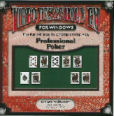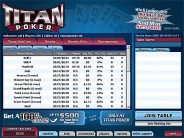
Turbo Texas Hold'em for Windows
Heads Up Strategy in Texas Hold'em
Poker tournaments are very popular and many players are giving them a try after having only played in side games. Playing at the final table of a tournament is different than a side game because as
Playing Texas Hold'em heads up against a single opponent requires a completely different strategy than playing at a full table. Many players I have talked to tell me that they have the most difficulty adjusting to playing heads up play and are not very successful when put in that situation. The reason for this is that they are used to playing a very tight game. In a heads up situation you can’t play tight and expect to win.
When you are playing heads up you can’t afford to wait. Many times it comes down to who can steal the most blinds. Therefore you must loosen up and call more or you will go broke. Queen – Seven is called the computer hand because computer simulations show this hand is will win 51.77 percent heads up against a random hand. So with this hand or any hand higher than this one you are almost forced to play. A small pair or even a single Ace or King can be a big favorite in heads up play.
Be the Aggressor
A player in the small blind can win by raising with every hand if the player in the big blind keeps folding to a raise. For example: The blinds are $50 and $100 which means there is $150 in the pot. The player on the button is the small blind and must act first before the flop. He raises by putting in an additional $150 bet. If you as the big blind fold, then the small blind has risked $150 to win $150. If you fold half the time the small blind will show a profit. He still will almost certainly profit in these situations since he will not only steal your blind, but will also sometimes win when you call as well.
If you only call in the big blind with a third of the hands that you are dealt. Then the small blind can raise every time and if you call, he can fold if you bet on the flop unless he flops a good hand. When this is the case, he's going to win $150 two out of three times, plus he's going to win more sometimes. He's going to lose the $150 less than one out of three times.
If you find yourself against a player using this strategy you will need to counter it by calling more or raising him. You have to let him know that it could cost him more than $150 if he raises you every time.
Analyze Your Opponent
You need to judge your opponents. Poker is a game about making judgments. You need to test the waters by doing the raising and being the aggressor. If you find yourself in a game with a passive player you now know how to beat him. If on the other hand your opponent is also aggressive you will have to use some discretion and very your play. If your opponent is very aggressive you will be able to trap him when you have a good hand. If you check he will more than likely bet and you beat him when he bluffs.
Act First
Playing heads up poker is a lot like playing chicken. This means you will need to bluff more before the flop and sometimes fire away after the flop with nothing. With just two players there will be many times when the flop doesn’t hit either player. Many times it is the person that acts first who will win the pot. Just remember that occasionally your opponent will have a legitimate. Although you don’t want to be bluffed out of a pot you will sometimes have to give it up to save your self from elimination. [p]
Chip Stacks
The size of your chip stack makes a big difference in how you play. If you have a big stack you can be much more aggressive as you opponent might be inclined to fold more often waiting for a big hand. While this may work there will be a time when they are forced to make a stand. Although you want to keep the pressure on you also don’t want to double up your opponent too often or you will soon find yourself with the short stack. You have to use selective aggression.
Beware the Limper
Limping in, means to simply call the big blind when a player is in the small blind. Players limp in from the small blind for two reasons. They are either trying to see the flop cheaply or they are trying to trap an aggressive opponent who they hope will raise from the big blind. If you have a big hand in the small blind and know your opponent will raise then you can limp in and try for a check raise. If you know the big blind will always raise if you limp in from the small blind then you must raise first. Your objective in heads up play is to try and extract the most money from your opponent. To do this you will have to mix up your play to keep your opponent guessing.
Practice
Becoming a proficient heads up player requires practice. You can practice at one of the online poker sites. Get together with a friend for some free practice or enter the small sit and go tournaments to hone your skills.

